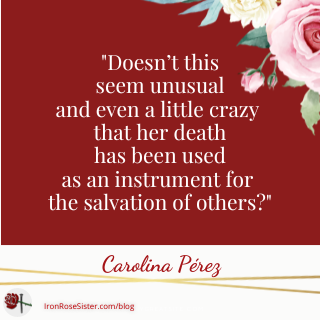-
Finding Your Function
 Written by Michelle Guzmán, volunteer with Iron Rose Sister Ministries in Colorado Springs, CO
Written by Michelle Guzmán, volunteer with Iron Rose Sister Ministries in Colorado Springs, CO"Form follows function" is one of the best-known concepts in the world of architectural design created by the famous Louis Sullivan (1856–1924). This principle establishes that the shape of a building or object must be completely related to the use, function, or purpose that this building or object will have. This principle or law was applied in its beginnings in the growing cities of Boston and New York when the number of people was greater than space. To solve this situation was to build vertically. The great skyscrapers we see today originated from the Sullivan principle.
New generations of designers have invented a new concept "Function follows Form" based on the principle of creativity and innovation. What this principle means is that the designer of a building can have freedom to create its shape without limits and the function will then adapt to the space created. An example of this is the Walt Disney Concert Hall building in Los Angeles, California designed by Frank Gehry (1999-2003).
What am I made for? Is my form following my function or my function following my form?
Am I made to carry out my function? Or, does my role depend on who I am?
The Bible is clear in telling us the many gifts and functions within the Body of Christ that we have to help build. But, how do I know what my gift is or what my part is within the Body of Christ?
How many times have you been stressed having to finish a task because you are very concerned about what people will think of you? How many times have you committed to more than what you can do in the month because you want to gain acceptance from people in your church or in your group of friends? Have you sought your value in the things you do in order to feel good?
1. God Created You with a Plan in Mind.
In Genesis 1:27-28 we clearly find God's intention when making us:
“So, God created mankind in his own image, in the image of God he created them; male and female he created them. God blessed them and said to them, “Be fruitful and increase in number; fill the earth and subdue it.” Then Genesis continues telling us the blessings that He has given us as provisions so that we can enjoy our stay on this earth.2. Being Before Doing.
The first purpose of God for each one of us before “DOING” something is “BEING”.
If we want to find our purpose we must first find out who we are. We are women made in the image of God. And what does this mean? Sometimes we become obsessed with looking for what to do without first looking for who we are. We focus on being daughters, sisters, students, housewives, moms, wives, workers, church members, volunteers, but we forget that in order to know our role we first have to remember who we are. According to God’s word we are His workmanship, formed in our mother's womb with His own hands.Jeremiah talks about his calling before he was born, but at the same time this passage teaches us again that before "DOING" one must "BE." The Lord makes three clarifications to Jeremiah in the first chapter of the book of Jeremiah: “You are chosen before you are formed. You are set apart before you are born. And you have a name to be and then do.”
“The word of the Lord came to me, saying, ‘Before I formed you in the womb I knew you, before you were born I set you apart; I appointed you as a prophet to the nations.” (Jer. 1:4-5)This also applies to you and me. As a woman, you were chosen before being formed, you were set apart before you were born, you were called a woman so that you could be first and then do. You are a divine creation of God, created with a perfect plan that only applies to you and nobody else, because you belong to Him. He loves you for what you are, not for what you do. Your name is daughter and creature of God, Woman.
3. Created in Christ Jesus for Good Works.
In Ephesians 2:10, we have a very clear vision of what we were created for, but again, this chapter teaches us that before we think about the what, we must remember who we are: “For we are God’s handiwork, created in Christ Jesus to do good works, which God prepared in advance for us to do.”Our wonderful functions were planned first to serve Him and second to belong. He stated beforehand that everything we do must be good works, so our second task after understanding who we are in Christ Jesus is to make sure that everything we “do” is good, and that it is what He planned for us.
By reading our Bible daily, seeking the Lord in prayer, saying good things to God, and praising Him with our words day and night, we develop an intimate relationship with Him that no one can break. He becomes the center of our actions and we can sit in the midst of His presence to talk with Him so that He can tell us how He made us and what He wants us to do. Our gifts and functions align with the desires of God's heart when we make ourselves available to Him in order to serve others every day.
Our function follows the form; how we were made, by Whom we were made, and His plan for our lives determines the function that we will carry out within the Body of Christ to lead a daily life of praise to God in community. Enjoy who you are according to God's plan so that what you do fills your heart and God’s heart. Are you ready for the "Be" before "Doing" challenge?
-
Sewing For The Lord
 Written by Carolina Pérez, volunteer with Iron Rose Sister Ministries in New York
Written by Carolina Pérez, volunteer with Iron Rose Sister Ministries in New YorkMany knew her. She was not a famous woman who was on television, in newspapers or magazines. She didn’t sign autographs, nor drive luxurious cars, but her service in the community where she lived benefited many and they knew very well who she was. She was recognized anywhere she went. Men and women spoke well of her, rich and poor sought her out. One day, she died, quite suddenly, but even her death favored the people around her. How absurd, right? But it’s true.
Yes, this is the story of a humble woman named Tabitha, better known as Dorcas. This woman was, without doubt, one of the most well-known women for giving a class or women’s conference on the topic of service. Almost everyone, at one time or another, had heard of her. You might be thinking, I already know this story! However, let’s see if we can discover together a little more about her.
Acts 9:36-42 narrates this unusual story. (Later, you will know why it seems unusual and you may agree with me.) As an interesting fact, her name means gazelle. We note at the beginning of the story that “she was always doing good and helping the poor” (v. 36). This helps us understand that these were not sporadic or occasional acts for Dorcas, but rather it was her way of life. It was a common thing in her day-to-day life; it was a part of her. Surely, she alluded to her name since a gazelle is agile and quick. She served others with promptness and without giving it a second thought.
She had a good reputation in her city and was a woman known in society because she helped anyone that needed economic or physical help—she sought the good of others. We don’t know her economic status, but everything she did, she did from the heart. We don’t have any information about how she came to hear the gospel and accept Jesus as her Savior. However, we can see that she that she was a woman of faith. That may seem like a hasty conclusion, but this is what we see through her works. In James 2:14-17, we can see that the evidence of our faith is our works; they cannot be disconnected. Dorcas possibly understood this concept perfectly and didn’t hesitate to put it into practice.
The Scriptures say that this woman fell ill one day and passed suddenly. What generally happened in that time was the body was prepared for burial immediately because decomposition of a cadaver doesn’t wait, especially in a warm climate. But what the people that were with her did in that moment is an untold part of the story: They washed her body and they put her in a room. They knew that the apostle Peter was in the nearby city of Lydda. They called him because they were sure that he could do something. They were all saddened by Dorcas’ death, which is normal when someone who has done so much for the community loses his or her life. What comes next is the resignation and acceptance of the loss of the beloved person. To the contrary, the people that loved her, hoped for a miracle, one like those they had heard of when they heard the gospel.
They sent two men urgently to search for Peter, and after telling him what happened, they begged him to come without delay to see her. When they arrived, there were many people crying and lamenting the loss. And here we can highlight the beautiful ministry this woman had. Verse 39 says, “Peter went with them, and when he arrived he was taken upstairs to the room. All the widows stood around him, crying and showing him the robes and other clothing that Dorcas had made while she was still with them.”
In those days, the widows were one of the social groups with least privilege; if they didn’t have children or family nearby, they were completely helpless. Yet we can see that they were not unseen by this disciple. She gave them clothes and possibly even taught them about sewing that they might, in that way, have a source of income and avoid begging in the streets, which is what often happened.
So, the apostle, upon seeing the scene, had compassion on them and, asking everyone to leave the room, prayed to God asking for the miracle that the people hoped for. The Heavenly Father responded positively to their request and, in accordance with His will, raised Tabitha. Thanks to what happened, “many people believed in the Lord” (v. 42). Who would say that even in her death, this woman was going to serve? Doesn’t this seem unusual and even a little crazy that her death has been used as an instrument for the salvation of others? This is how God works in hopeless situations, in the most mysterious ways, all for His glory.
This woman’s work was so noticeable that her story is registered in the pages of the Bible so that we can tell it and learn from her today.
What impact have you had in the place where you are—be that your home, your neighbors, your work, your school, etc.? Are you serving with love? When you pass, what legacy will you leave? How will you be remembered?
May the Lord help us to be true servants to His glory.
#IronRoseSister #HIStories #service #Tabitha #Dorcas #servefromtheheart #guestwriter #blog
See more photos on our Photo Gallery page.
(c) Iron Rose Sister Ministries. Site setup by Perfect Fit Web Design; Flag icons by Free Flag Icons

